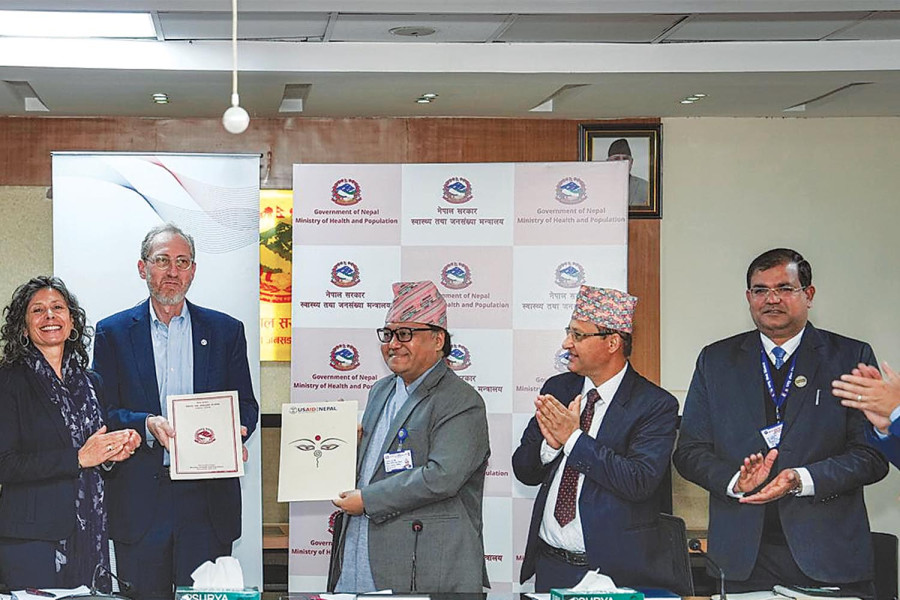National
USAID works in line with Nepal’s priority: Schiffer
The donor agency’s Global Health Security programme, which aims to strengthen Nepal government’s capacity to prevent, detect, and respond to emerging infectious diseases, was launched on Sunday.
Post Report
The Ministry of Health and Population and the United States Agency for International Development (USAID) on Sunday jointly launched USAID’s Global Health Security programme, a strategic partnership to strengthen Nepal government’s capacity to prevent, detect, and rapidly respond to emerging infectious diseases.
This programme will be implemented through ‘One Health,’ a collaborative, trans-disciplinary approach that recognises the interdependence among the health of ecosystems, wildlife and domestic animals, and humans, the USAID said in a statement on Sunday.
This partnership will advance US efforts to strengthen technical capacities in 50 countries by 2025 as part of the Biden administration’s goal to strengthen health security and pandemic preparedness globally.
“USAID’s Global Health Security work is helping to fill that gap by strengthening countries’ capacities to prevent, detect, and respond to disease threats before they can become a pandemic, while advancing World Health Organisation (WHO) International Health Regulations targets so that countries can address gaps and priorities at the national level,” reads the statement.
Through the Global Health Security programme in Nepal, USAID will fund the Ministry of Health and Population to strengthen the One Health platform and surveillance systems. USAID will also work through the WHO and the Food and Agriculture Organization (FAO). Through WHO, USAID will support strengthening disease surveillance especially emerging infectious diseases; improving national laboratory systems to detect emerging infectious diseases and antimicrobial resistance (AMR); and enhancing health emergency management response for infectious diseases.
In total, USAID will provide up to $6.75 million for these efforts over the next three years, subject to availability of funds.
Speaking at the launch event in Kathmandu, USAID’s Assistant Administrator for Bureau of Asia Michael Schiffer said, “This programme marks a significant step forward in ensuring the health and security of the Nepali population and reflects USAID's ongoing commitment to global health and pandemic preparedness.”
Later in the day, speaking with media persons, Schiffer said that US-Nepal partnership and friendship is growing stronger and will grow ever stronger. “As per the wish of the Nepali people to fulfill their aspirations, the USAID is working with the government of Nepal, civil society, media and other stakeholders,” he said.
When asked about shrinking democratic space in Nepal, he said the US government is committed to press freedom and freedom of expression but the development partners do support the path chosen by the Nepali people and the government.
Responding to a query on why USAID prefers to invest in software sectors at a time when there is dire need of investment in hardware and large infrastructure projects, the USAID mission director to Nepal, Sepideh Keyvanshad, said that they are regularly in touch with finance ministry officials and those from other line ministries where they also receive the similar kind of feedback but the USAID is putting money in Nepal as per the development need of the country.
“Software is just so important that we want to continue supporting Nepal in the sector and work closely with the government and civil society,” she said.
Keyvanshad, who arrived in Kathmandu last week and met with several leaders and officials, outlined the priority areas of Nepal that USAID is working on—from climate change to energy transition to agriculture, health, and job creation, among others.
The USAID is also working towards strengthening federalism in Nepal, Keyvanshad said, adding that they are aware about the recent protests against the federal republican set up and discontentment in the streets.
“There are challenges but the US agency works with the government of Nepal and the priority set by the government,” she said.
“Priorities keep changing, we adopt them, the situation also does change, but we are working as per the priority of the government and its needs. But this [support to the federal set up] will continue.”
Schiffer said that federalism itself is a contested issue even in the US but it is ensured that democracy is working and democratic governments are prevailing.
Keyvanshad said that Nepal and the US are good friends and good partners. “As per the aspirations and goals set by the government, we work with them. We listen to the government,” she said. “We are also putting our investment into co-design and co-creation so that we can work for the future too. We are working as per the priorities set by Nepal and what you want.”
Nepal and the US forged a diplomatic relation over 70 years ago while USAID’s support to Nepal has crossed six decades. Both Keyvanshad and Schiffer expressed satisfaction over the progress made by the USAID-funded projects and programmes, stating that the US government and Congress have put a strong oversight mechanism to monitor USAID’s activities.




 16.12°C Kathmandu
16.12°C Kathmandu













